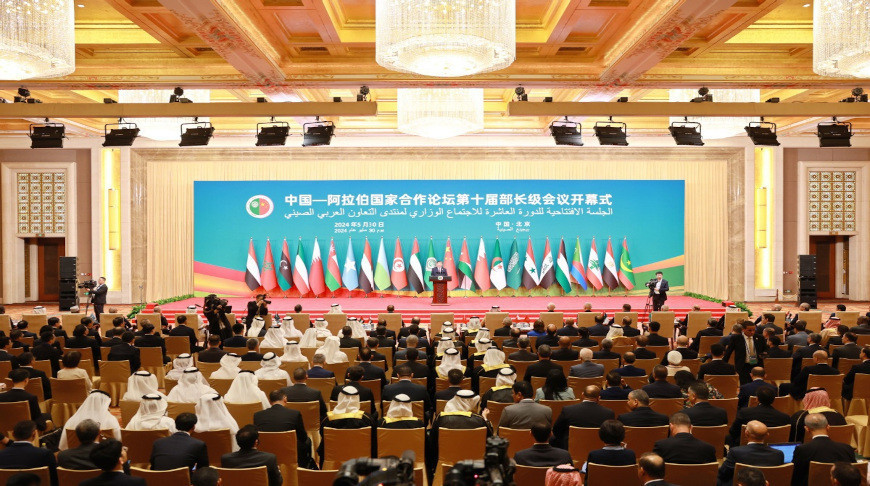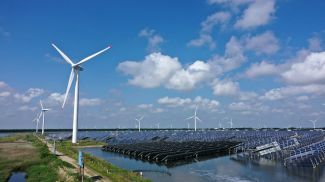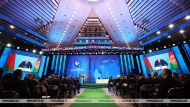
BEIJING, 3 June (BelTA - China Daily) - China and Arab states have
substantial potential to deepen their economic and trade relations,
particularly in the financial and energy sectors, boosting growth for
both sides and contributing to global economic recovery, experts and
business leaders said on Thursday.
Driven by the tangible growth of the Belt and Road Initiative, China and Arab states are likely to expand business ties in areas such as the digital economy, finance, new infrastructure, clean energy, trade in services and high-end manufacturing, they said.
In his keynote speech on Thursday at the opening ceremony of the 10th Ministerial Conference of the China-Arab States Cooperation Forum, President Xi Jinping said that China supports closer cooperation between financial institutions on both sides, welcomes Arab states to issue panda bonds — renminbi-dominated bonds issued by overseas institutions in the Chinese onshore market — in China, and welcomes Arab banks to join the Cross-border Interbank Payment System.
China will support its energy companies and financial institutions in participating in renewable energy projects in Arab states, with a total installed capacity of over 3 million kilowatts, he said.
Mohammed Al Ajlan, chairman of the Saudi-Chinese Business Council, said that with China entering a new era of green and innovation-led growth, Arab companies are optimistic about its long-term growth potential and see abundant opportunities arising from the country's focus on the high-end manufacturing industry and the digital economy.
Li Lei, vice-president of Saudi Basic Industries Corp, said the new cooperative content between China and Arab states will not only benefit global trade, but also create more growth points for Arab companies to build their global supply chains and consumer bases in China.
Fueled by their complementary industrial structure, the BRI development and the long-term cooperation in the energy sector, China's foreign trade with the League of Arab States soared 820.9 percent over the past two decades, from 303.8 billion yuan ($42 billion) in 2004 to 2.8 trillion yuan in 2023, data from the General Administration of Customs showed.
In the first four months of this year, China's trade with the League of Arab States reached 946 billion yuan, marking a historic high for the same period, with a year-on-year increase of 3.8 percent, accounting for 6.9 percent of China's total foreign trade value.
Arab products such as Egyptian oranges, Syrian rose essential oil, Tunisian olive oil and Saudi dates are increasingly popular among Chinese consumers, while Chinese-made new energy vehicles, home appliances and smartphones are finding their way into more Arab homes, said Lin Meng, director of the Modern Supply Chain Research Institute at the Beijing-based Chinese Academy of International Trade and Economic Cooperation.
Ahmed Fahmy, head of the League of Arab States' China representative office, said that Chinese electric vehicles are performing exceptionally well in many Arab countries, thanks to their technological prowess and economy of scale.
This success positions Chinese companies as potential partners with Arab states in driving energy transformation, he said.
Fahmy noted that by leveraging China's technological and cost advantages through collaboration, both sides could expedite their decarbonization efforts and set a model for joint action against climate change.
Driven by the tangible growth of the Belt and Road Initiative, China and Arab states are likely to expand business ties in areas such as the digital economy, finance, new infrastructure, clean energy, trade in services and high-end manufacturing, they said.
In his keynote speech on Thursday at the opening ceremony of the 10th Ministerial Conference of the China-Arab States Cooperation Forum, President Xi Jinping said that China supports closer cooperation between financial institutions on both sides, welcomes Arab states to issue panda bonds — renminbi-dominated bonds issued by overseas institutions in the Chinese onshore market — in China, and welcomes Arab banks to join the Cross-border Interbank Payment System.
China will support its energy companies and financial institutions in participating in renewable energy projects in Arab states, with a total installed capacity of over 3 million kilowatts, he said.
Mohammed Al Ajlan, chairman of the Saudi-Chinese Business Council, said that with China entering a new era of green and innovation-led growth, Arab companies are optimistic about its long-term growth potential and see abundant opportunities arising from the country's focus on the high-end manufacturing industry and the digital economy.
Li Lei, vice-president of Saudi Basic Industries Corp, said the new cooperative content between China and Arab states will not only benefit global trade, but also create more growth points for Arab companies to build their global supply chains and consumer bases in China.
Fueled by their complementary industrial structure, the BRI development and the long-term cooperation in the energy sector, China's foreign trade with the League of Arab States soared 820.9 percent over the past two decades, from 303.8 billion yuan ($42 billion) in 2004 to 2.8 trillion yuan in 2023, data from the General Administration of Customs showed.
In the first four months of this year, China's trade with the League of Arab States reached 946 billion yuan, marking a historic high for the same period, with a year-on-year increase of 3.8 percent, accounting for 6.9 percent of China's total foreign trade value.
Arab products such as Egyptian oranges, Syrian rose essential oil, Tunisian olive oil and Saudi dates are increasingly popular among Chinese consumers, while Chinese-made new energy vehicles, home appliances and smartphones are finding their way into more Arab homes, said Lin Meng, director of the Modern Supply Chain Research Institute at the Beijing-based Chinese Academy of International Trade and Economic Cooperation.
Ahmed Fahmy, head of the League of Arab States' China representative office, said that Chinese electric vehicles are performing exceptionally well in many Arab countries, thanks to their technological prowess and economy of scale.
This success positions Chinese companies as potential partners with Arab states in driving energy transformation, he said.
Fahmy noted that by leveraging China's technological and cost advantages through collaboration, both sides could expedite their decarbonization efforts and set a model for joint action against climate change.













